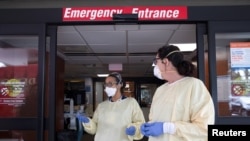Student Union
Health Care Jobs Spike in US After Pandemic

The fastest growing jobs in the fastest growing field — STEM, or science, tech, engineering and mathematics — are in health care.
“Health care is still booming,” said Marisa Streelman, national director of the Academy of Medical-Surgical Nurses (AMSN), a professional nursing association with members in the U.S. and internationally.
“Cybersecurity in healthcare, physical security, system improvements, telehealth, and the need for monitoring in the home and community health,” Streelman said, are some of the jobs in health care that are experiencing swift growth.
Among the top 30 fastest-growing professions are medical and health services managers, physician assistants, speech pathologists, substance abuse and mental health counselors, and marriage and family therapists, according to the U.S. Bureau of Labor Statistics.
The highest paying jobs in health care, according to BLS, are physician assistants, who make $115,390. Tech jobs like software developers by comparison make $110,140. Epidemiologists, or those who investigate patterns and causes of diseases, such as the COVID-19 pandemic, make an average of $74,560, according to BLS figures.
Aging populations and the COVID-19 pandemic have driven up the demand for healthcare positions, particularly for practitioners and technicians who diagnose or treat illness or have the technical skills to perform procedures and work with special equipment, according to BLS.
Veterinary skills are also in demand.
“What COVID did is it showed our gaps,” said Streelman, referencing the difficulty for some individuals to get time off work to visit a doctor when a video or phone appointment could suffice.
The pandemic has resulted in needs in telehealth and public health, such as for local health sites for emergency uses like testing centers, vaccines, and nursing staff.
“The pandemic brought to everyone’s attention that telephone triage and telehealth is safe, that it has the same outcomes as inpatient care, that is a huge satisfier to people that would much rather stay home and do their visit from the comfort of their home, especially if you’re sick,” said Kathleen Martinez, president of the American Academy of Ambulatory Care Nursing, an organization for a community of registered nurses.
Management consulting firm Mckinsey & Company said in February, online consultations through Practo, a telehealth company in India, grew more than tenfold from April to November 2020. Although in-office visits will resume, telehealth is likely to increase, the report added.
Research-based healthcare jobs will also see a rise in job opportunities resulting from the pandemic.
An updated BLS report in February found that there are “strong gains in jobs related to research and development in STEM (including physical, engineering, life sciences and health-related job clusters.”
The report predicts that there will be “strong growth” in specialized areas including, “epidemiologists, medical scientists, biochemists and biophysicists, and biological technicians.”
Emerging jobs
Nursing informatics is a discipline that will be in high demand and analyzes data to improve nursing practice. It is focused on technology helping the nursing workflow, such as managing electronic health records, or EHRs, that are required of all care facilities.
“Nursing informatics is huge right now,” said Streelman. “As more and more of our systems become electronic, and more and more of our equipment is used at the bedside and beyond, you see more and more equipment, wireless equipment and monitoring equipment that can be used in the home.”
Opportunities in biotechnology and biomedicine will be on the rise to assist the changes in health care.
Artificial intelligence
Artificial Intelligence, or AI, experts say, will move healthcare forward, as well. AI can analyze large volumes of data to more quickly diagnose and treat patients and illnesses.
“On the information technology side, we’re seeing engineers and scientists utilizing AI tools to transform the traditionally unstructured data, like MRI images, audio sounds, and diagrams which pose different kinds of information, which are unstructured and very hard to interpret,” said Linxin Gu, a Global Shaper at the World Economic Forum.
Gu began with a degree in biomedical engineering from Sichuan University in China and has studied at six institutions, including in China, Japan, and the United States.
Artificial intelligence
There are numerous applications for AI in healthcare, Gu said. She said someone interested in joining the industry should research it first to find where their personal interests fit.
“First understand yourself and then, second, do research about the people that are already holding your position,” she told VOA.
An early start and experimenting in different areas within the industry is crucial for success, she added. Qualifications and degrees needed to join the technological side of the healthcare industry also vary depending on the person’s goal, Gu said.
“If you want to work more on the information side,” she said, “there’s no required degree, but most people would get at least a bachelor’s degree to work on the IT side, either in biomedicine, biomedical engineering, or bioinformatics or computer science.”
Location is another key factor, Gu said. “In China, you have to get a master’s degree, because there are so many people with abundant degrees,” she said.
“If you want to conduct research,” Gu added, “master’s degree and a Ph.D. are both good. But in terms of independent research, you have to get a Ph.D.,” she said.
But ultimately, Gu said, several factors guide a person to achieve success in the industry. It depends on “where you want to go, what really interests you, and will you feel like you’re passionate about and where you want to work,” she said.
See all News Updates of the Day
- By VOA News
Michigan State international students get their own space

Michigan State University in East Lansing, Michigan, is setting aside a space in the International Center for international students.
Nidal Dajani, vice president of the school's International Student Association, said that the club plans to use the space to host events and hopes to collaborate with other student groups.
- By Dylan Ebs
International students find community during Pride Month

For LGBTQ+ international students, Pride Month, observed in June, is a unique time to reflect.
They hold on to multiple identities — both their LGBTQ+ identity and their cultural background — but coming to terms with them is not always easy.
For graduate student David Zhou, these identities can feel conflicting as transgender rights in China remain a controversial issue and spaces for LGBTQ people close. Zhou, 25, is transgender and pursuing an education in the STEM field at an urban university in the Midwestern United States.
VOA is using a pseudonym for Zhou’s first name and is not naming his university to protect his identity due to safety concerns back home in China. Zhou is not open about his transgender identity to his family.
During Pride Month, Zhou said he attended multiple LGBTQ+ events in his community and is surrounded by a supportive group of LGBTQ+ students who can relate to his experiences. But he’s not open about his identity to everyone on campus and said he doesn’t disclose his preferred pronouns to everyone to avoid transphobic comments.
“I feel like I have to make some judgments of the character of that person to see if they’re a good person to disclose [my identity] to,” Zhou said.
Zhou’s Pride Month celebrations included attending local markets with LGBTQ+ vendors and hanging out with his LGBTQ+ friends.
“They normalized being trans and for a long time I feel like trans identity is, should I say a vulnerability, brings me fear and worrying about discrimination, but having those events are helpful because it allowed me to see that queer people could just [live] openly,” he said.
At social events where few international students are present, Zhou said it can be tough to fit in.
“There's a lot of times like when they were talking about things I kind of, don't really understand, mostly because I kind of lack some background experience or knowledge,” he said.
Zhou said he is not aware of specific groups for LGBTQ+ international students at his university, but said international students are more prevalent in graduate programs and therefore find representation in organizations for LGBTQ+ graduate students.
In China, transgender individuals must obtain consent from an “immediate family member,” even for adults hoping to transition, which critics say limits the autonomy of transgender individuals while supporters say the policy protects doctors from violence by upset parents.
Struby Struble, a former coordinator of the University of Missouri LGBTQ+ Resource Center, told NAFSA: Association of International Educators in 2015 that LGBTQ+ international students face a “double barrier” on campus.
“With their international student friends, they feel isolated because they’re the LGBT one,” she said. “But then among the LGBT students on campus, they feel isolated because they’re the international one.”
Nick Martin, associate director of the Q Center, Binghamton University’s LGBTQ+ student support office, said when international students tour the center, there’s often a sense of hesitation as they enter a type of space that may not be present in their home country.
“I compare that to a year in after they've come into the space, they've again, maybe come to some of our events, they've got more connected,” he said.
Martin said graduate students have a unique interest in the Q Center as they may use the office for research and advocacy purposes that align with their studies.
“For older students, there may be hesitancy in a different way, but I think it's more in the vein of they want to do some of the advocacy work,” he said.
Martin said he thinks about how both his office and BU’s international student office can support students who come from countries with few — if any — protections for LGBTQ+ individuals.
“It's been a learning process of what those students really need, but I think I've kind of learned that a lot of students are just looking for the safe space that we offer,” Martin said.
- By VOA News
International students discuss US campus culture shock

International students at De Anza College in Cupertino, California, talked about culture shock in an article in La Voz News, the student newspaper.
"It felt like a major culture shock. Everything was so different, from academics to mannerism," said a student from Mexico.
Read the full story here.
These are the most expensive schools in the US

High tuition costs along with housing and food expenses can add up for students at U.S. colleges and universities.
MSNBC looked at the most expensive schools in the country, with one costing more than $500,000 for a bachelor’s degree. (June 2024)
Uzbekistan students admitted into top US universities

Students from Uzbekistan are among the international students admitted to top colleges and universities in recent years.
Gazata.uz profiled some of the Uzbekistan students attending Harvard, Brown, Princeton and other U.S. universities. (June 2024)









